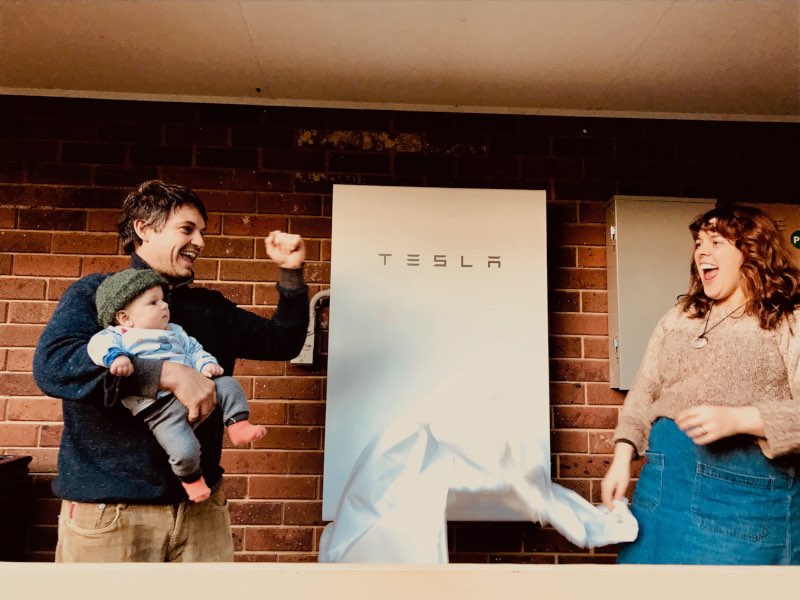

In what looks like a clear move against batteries by an energy company, Victoria-based network operator AusNet Services has all but banned the Tesla Powerwall 2 for some solar home owners.
Under AusNet’s updated standard operating procedure (SOP 32) and their updated approval procedure it’s impossible for their luckier customers to install anything bigger than a 5kW inverter with a Tesla Powerwall 2 (PW2).
But for many people, on the edge of the grid, that limit is set at just 2kW, which is similar to the average sized system installed in 2008 over 10 years ago.
That is because AusNet is offering a standard grid export limit of either 3.5kW or 5kW with a maximum inverter capacity of 7kw or 10kW. Even though the Tesla PW2 is not configured to export at all, they are treating it as an inverter, the same way they treat solar inverters with solar panels hooked up to them.

The problem is that to properly cycle a Tesla PW2 through winter (it’s warranted for one cycle per day and the economics which are not great to start with dictate that you are using it to its full potential) you really need at bare minimum a 6kW inverter (For example Fronius or Solaredge) with 9000W of panels (the warranted limit of these inverters).
People who buy the PW2 want protection against blackouts, people such as Ausnet’s customers, many of whom are on the edge of the grid in the rural and regional areas.
For those homeowners to have that blackout protection they need a decent-sized solar system during an outage or there will not be sufficient solar potential to recharge the battery and keep their emergency power supply running.

So for customers across eastern Victoria and outer east Melbourne those near Bairnsdale, Bright, Buchan or Benalla wanting to do the right thing, they are being completely blocked by AusNet’s rules.
This is clearly a political question. The people of Victoria want solar and storage, they want to contribute to getting the coal and gas off our electricity grids by exporting their surplus solar energy and they also want to be self-sufficient when it comes to energy.
So where is the Victorian Energy Minister Lily D’Ambrosio and the solar lobby on this? It’s up to them to ensure that Victorian electricity consumers and solar homeowners present and future are properly served and to ensure that Ausnet accepts the Tesla PW2 (and equivalents) with a decent sized solar system, like all other electricity distributors in Victoria do.
Given that one Hong Kong company, CK Holdings, basically controls all of the Victorian distributors, there doesn’t seem to be any reason why Ausnet should be allowed to have such anti-solar anti-battery policies, while its business cousins United, Jemena, Powercor and Citipower are quite reasonable and allow 10kW+ inverters with export limiting, which means 20kW solar systems (a common size in rural applications) is possible with a Tesla PW2 all on a single phase.
Previously, the state energy department’s advice to me was that distributors cannot block customers who want to have a home storage battery. This advice clearly needs to be updated and published because at the moment that is exactly what appears to be happening.
Australians are moving to solar, Victorians are moving to solar and the only thing slowing us down are the lumbering dinosaurs of the energy sector, the old guard energy companies trying to preserve fossil fuel assets and those that aide and abet.
It’s time for politicians to tell the energy companies and their lobby groups to pull their heads in, and stop obstructing Australia’s progress towards clean, affordable energy for all.
This is not the first time AusNet has displayed poor form. Previously, Professor Peter Seligman and the author caught out the DNSP charging for truck appointments to change meters and connect new solar that they weren’t actually doing.
None of the millions of dollars in revenue they collected for these fees (for no service) has been refunded. Fortunately, at least after being embarrassed in the public sphere about this practice they stopped charging the $350-odd fee.
Matthew Wright is executive director of Pure Electric
*One Step Off The Grid spoke to AusNet about this and other issues with solar and battery connection approvals and has published the DNSP’s response as part of a broader story on the subject here.



